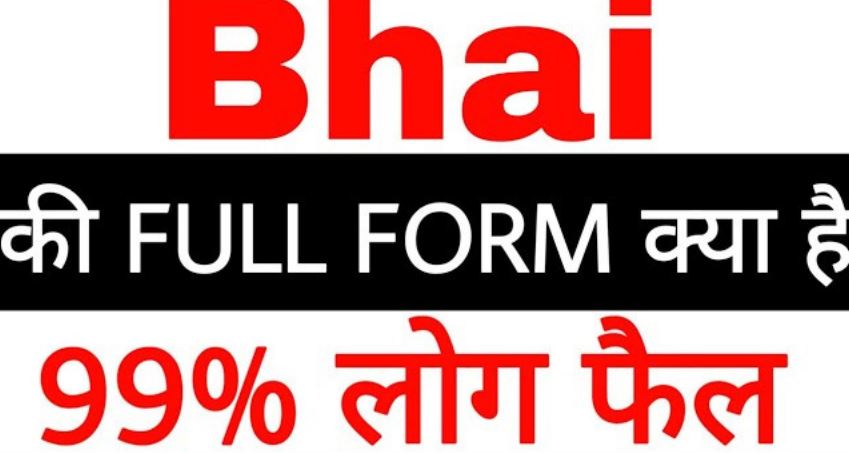Bhai Ka Full Form! “Bhai ka” is a common phrase in Hindi, Urdu, and other South Asian languages, where “bhai” translates to “brother” in English. However, it is important to note that “Bhai ka” does not inherently have a specific “full form” as it is already a complete phrase. It simply means “of brother” or “belonging to brother” in a literal translation.
In South Asian culture, the term “bhai” holds significant cultural and social connotations. It is often used to address or refer to one’s male siblings or close male friends in an affectionate or respectful manner. Additionally, “bhai” can also carry a sense of camaraderie, loyalty, and protection, reflecting the strong bonds that exist within families and communities.
Outside of familial contexts, “bhai” can also be employed colloquially to address strangers or acquaintances, particularly in regions where languages like Hindi or Urdu are spoken. This usage underscores the sense of familiarity and warmth that is often characteristic of interactions in these cultures.
BHAI Ka Full Form in English
The term “bhai” serves as an honorific title in several South Asian nations, notably India, Pakistan, Bangladesh, and Nepal. Primarily utilized to address older siblings or male companions with affection and reverence, it embodies familial and fraternal bonds within these cultures. However, beyond its conventional usage, “bhai” also encapsulates a broader significance as an acronym, standing for “Brotherhood of Hope and Inspiration.” This expanded interpretation underscores the ethos of unity, support, and motivation intrinsic to the term, advocating for the cultivation of robust interpersonal connections and the ideals of camaraderie within society.
Read More: LPA Full Form in Hindi and English
BHAI Ka Full Form in Hindi
“भाई” का पूरा रूप “भ्राता है अभिव्यक्त्त इंसान” होता है। यह हिन्दी भाषा में एक सामान्य शब्द है जो परिवार और समुदाय में भाईचारे को दर्शाता है। “भाई” को सामाजिक, सांस्कृतिक, और परिवारिक बंधों का प्रतीक माना जाता है और विभिन्न समाजों में व्यापक रूप से मान्यता प्राप्त है। “भाई” केवल शब्द ही नहीं है, बल्कि यह प्रेम, सम्मान, और आदर के एक रिश्ते को दर्शाता है जो मानव संबंधों और समाजिक सामंजस्य में महत्वपूर्ण होता है।
Frequently Asked Questions
What is the full form of “Bhai Ka”?
“Bhai Ka” does not have a specific full form. In languages like Hindi and Urdu, “bhai” means “brother,” and “ka” is a possessive marker. Together, they form a complete phrase meaning “of brother” or “belonging to brother.”
Is there an acronym for “Bhai Ka”?
“Bhai Ka” is not typically used as an acronym. It is a common phrase in South Asian languages, representing familial or fraternal relationships.
What is the significance of “Bhai Ka”?
“Bhai Ka” signifies brotherhood, camaraderie, and respect within South Asian cultures. It reflects the strong bonds between siblings or close male friends.
Can “Bhai Ka” stand for anything else?
While “Bhai Ka” itself doesn’t have alternative expansions, “Bhai” is sometimes used as an acronym in contexts unrelated to its traditional meaning. For example, in colloquial language, it might represent “Brotherhood of Hope and Inspiration” or similar phrases, but this usage is not standard or widely recognized.
How is “Bhai Ka” used in everyday language?
“Bhai Ka” is commonly used to address or refer to one’s male siblings or close friends affectionately. It can also be employed more broadly to express camaraderie and respect, even between strangers, particularly in regions where Hindi or Urdu are spoken.
Is there a cultural significance to “Bhai Ka”?
Yes, “Bhai Ka” holds cultural significance, representing the strong familial and social ties valued in South Asian societies. It embodies the ideals of brotherhood, unity, and supportiveness.
Conclusion
The phrase “Bhai Ka” does not have a specific full form or acronym. Instead, it represents the familial or fraternal bonds within South Asian cultures, particularly in languages like Hindi and Urdu where “bhai” translates to “brother” and “ka” denotes possession. While “Bhai Ka” may not have an expanded form in its traditional usage, it holds profound cultural significance, symbolizing brotherhood, camaraderie, and respect. This phrase underscores the importance of strong relationships and unity within families and communities. While it may not carry an acronymic meaning in standard usage, “Bhai Ka” continues to be an integral part of everyday language, embodying cherished values and sentiments of kinship and solidarity.
